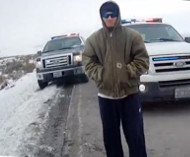6/14/2017
Federal Appeals Court Outlaws Coordinated Traffic StopsNinth Circuit appeals court upholds decision returning $167,070 to motorist who was never charged with any crime.

Police are adapting to the limitations the US Supreme Court has been placing on traffic stops. Once an officer is done writing a ticket, the motorist is supposed to be free to leave without unnecessary delay. A Nevada state trooper, however, realized he could get around this time restriction by calling ahead to have the same car pulled over by a second officer. The Ninth Circuit US Court of Appeals on Monday said such tactics went too far.
On the morning of January 23, 2013, Trooper Greg Monroe applied this technique to Straughn Samuel Gorman after pulling over his motorhome. Gorman was dawdling in the left lane of Interstate 80, near Wells. Gorman said he was trying to get around a slow-moving truck in the right lane, and he intended to get back over as soon as he passed it -- without exceeding the speed limit. Gorman told the trooper that he was on his way to Sacramento, California to see "his chick."
Trooper Monroe testified that he was immediately suspicious of that answer, since he believed a 31-year-old would not use that word. The trooper returned to his squad car and requested a drug-sniffing dog, only to be told there were none available.
"Oh great," Trooper Monroe told his dispatcher. "Without a dog I'm not even going to get in to this one."
After twenty minutes had elapsed, Gorman's paperwork was found to be in order, and the trooper decided not to issue a citation. Gorman was told he was free to go, but the trooper continued asking questions. Gorman refused to allow his motorhome to be searched. He did admit, however, that he was carrying $2000 in cash. After a few minutes, Trooper Monroe returned to his squad car and Gorman drove away.
"He's carrying money," Trooper Monroe said aloud.
The trooper then asked dispatchers to arrange for another traffic stop, this time with a drug dog ready to search the vehicle he "strongly suspected was carrying money." Elko County Sheriff's Deputy Doug Fisher responded by pulling over the motorhome because one of its windows had a partially drawn curtain, and the vehicle touched the fog line three times. On the side of the road, Gorman told the officer that he had just been pulled over a few minutes ago.
"I don't know if you got stopped, because I get told that quite often... as a distraction," the deputy said.
Phone records show that the deputy did know, because he had spoke to Trooper Monroe just before pulling over the motorhome. The trial judge also noted discrepancies in the deputy's statements about the basis for the stop.
Exasperated, Gorman explained to the deputy why he was not interested in answering his questions.
"I was just held for seriously twenty to thirty minutes," Gorman said. "I answered a bunch of questions and he finally let me go... I'm done talking."
A drug dog was then used to search the motorhome over Gorman's objection. The drug dog alerted on the vehicle -- even though it carried no drugs.
"Did you make him alert?" Gorman asked.
The trooper denied doing so. He did, however, help himself to the $167,070 in cash found within the vehicle. The money was forfeited, even though Gorman was never charged with a crime. At trial over the seizure, the judge reviewing the case called out federal prosecutors for attempting to conceal the connection between the trooper's and the deputy's traffic stops.
"The government has a duty of candor and fair disclosure to the court," US District Judge Larry R. Hicks wrote. "The court expects and relies upon the United States Attorney's office to be candid and forthcoming with material information uniquely held only in possession of the government and clearly relevant to central issues before the court. That did not occur here."
Judge Hicks not only ordered Gorman's money returned, but he also awarded $146,938 in attorneys' fees (view ruling). The appellate panel agreed that this was the right thing to do.
"Non-routine record checks and dog sniffs are paradigm examples of 'unrelated investigations' that may not be performed if they prolong a roadside detention absent independent reasonable suspicion," Judge Stephen R. Reinhardt wrote for the unanimous three-judge panel.
The appellate judges blasted the first traffic stop as unlawful, and because the second stop was essentially an extension of the first, it, too, was illegal.
"Here, the officers' impermissible gamesmanship is precisely what the Constitution proscribes," Judge Reinhardt wrote. "The analysis allows us to see the officers' conduct in Gorman's case as what it is: a single integrated effort by police to circumvent the Constitution by making two coordinated stops... An illegal police venture cannot be made legal simply by dividing it into two coordinated stops."
A copy of the ruling is available in a 200k PDF file at the source link below.


